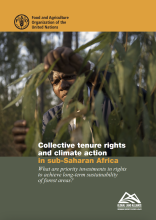Land Library
Welcome to the Land Portal Library. Explore our vast collection of open-access resources (over 74,000) including reports, journal articles, research papers, peer-reviewed publications, legal documents, videos and much more.
/ library resources
Showing items 1 through 9 of 290.GLA believes it is crucial to collectively advance thinking, dialogue, and action on the role of land rights and tenure security to make the VCM and other nature-based markets equitable, efficient and sustainable.
- Clarity on who owns emissions reductions (ERs), including who is entitled to benefit from Reducing Emissions from Deforestation and forest Degradation, plus the sustainable management of forests, and the conservation and enhancement of forest carbon stocks (REDD+), is paramount to acce
The study on collective tenure rights and climate action in sub-Saharan Africa aims to consolidate and analyse the state of the evidence on how tenure arrangements – in particular collective ownership and management of forests operating in complex systems of contingent factors – impact forest con
Land tenure security is a concept that informs land governance interventions. In short, the thinking is that tenure security will lead to positive economic, environmental and social impacts and hence to improved livelihoods for the land right holders.
International bi-lateral agreements to support the conservation of rainforests to reduce greenhouse gas emissions are growing in prevalence. In 2009, the governments of Guyana and Norway established Guyana’s Low Carbon Development Strategy (LCDS).
Forests and carbon sequestration have become fundamental themes in climate change mitigation. The idea of Reducing Emissions from Deforestation and forest Degradation (REDD+) has generated significant interest in forest governance from United Nations (UN) climate strategies over the past decade.
Reducing Emissions from Deforestation and Forest Degradation (REDD+) offers developing countries an opportunity to engage in global climate change mitigation through the sale of carbon credits for reforestation, avoided deforestation and forest conservation projects.
Reduced Emissions from Deforestation and Forest Degradation (REDD+) has been systematically advanced within the UN Framework Convention on Climate Change (UNFCCC). However, implementing REDD+ in a populated landscape requires information on local costs and acceptability of changed practices.





